Health (110 found)
INVISIBLE LIVES: The Untold Story of Displacement Cycle in Burma
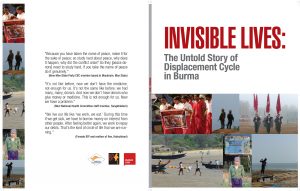 Recently, much attention surrounding Burma has focused on the democratic reform, 2015 elections and the future of the National League for Democracy (NLD)-led Government, whilst a profound humanitarian crisis and continuing concerns of the ethnic minority communities in the southeast have been largely ignored […]
Recently, much attention surrounding Burma has focused on the democratic reform, 2015 elections and the future of the National League for Democracy (NLD)-led Government, whilst a profound humanitarian crisis and continuing concerns of the ethnic minority communities in the southeast have been largely ignored […]
Military Confiscation of Karenni Ancestral Land in Karenni State, Burma
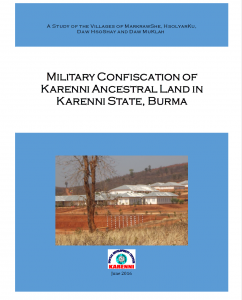 In Karenni State, the people and their ancestors have traditionally depended on agricultural land for their livelihood […]
In Karenni State, the people and their ancestors have traditionally depended on agricultural land for their livelihood […]
International Religious Freedom Report for 2015
The constitution guarantees every citizen “the right to freely profess and practice religion subject to public order, morality or health and to the other provisions of this Constitution.” The government adopted a package of four laws that many local and international nongovernmental organizations (NGOs) said were an infringement on religious freedom and other basic rights […]
• • •International Law on Minorities’ Right to Self-Identify
The Rohingya are a predominantly Muslim minority concentrated in Rakhine State (also known as Arkan State) in Myanmar. According to the late Gordon Luce and Than Tun, leading historians of pre-colonial Burma, stone inscriptions dating back to 1400 AD establish the historical presence of the Rohingya people in what is today western Burma […]
• • •Hidden Strengths, Hidden Struggles: Women’s testimonies from southeast Myanmar
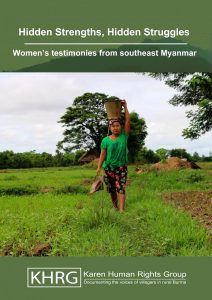 This report presents women’s testimonies in respect of various issues during the reporting period of January 2012 to March 2016. These issues include the dangers posed to women by the presence of armed actors in communities; the effects of land confiscation and development projects on women’s livelihoods; women’s access to healthcare and education; the continued occurrence of gender-based violence; and the harms caused by landmines; forced labour; arbitrary taxation and extortion […]
This report presents women’s testimonies in respect of various issues during the reporting period of January 2012 to March 2016. These issues include the dangers posed to women by the presence of armed actors in communities; the effects of land confiscation and development projects on women’s livelihoods; women’s access to healthcare and education; the continued occurrence of gender-based violence; and the harms caused by landmines; forced labour; arbitrary taxation and extortion […]
Examining Foreign Direct Investment in Mon State, Burma
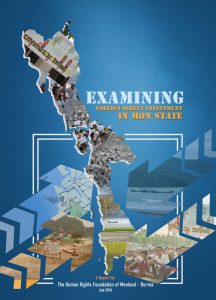 Over the years, the Human Rights Foundation of Monland (HURFOM) has produced a number of accounts highlighting the hardship faced by Mon people who have become victims to land confiscation […]
Over the years, the Human Rights Foundation of Monland (HURFOM) has produced a number of accounts highlighting the hardship faced by Mon people who have become victims to land confiscation […]
Achieving Health Equity in Contested Areas of Southeast Myanmar
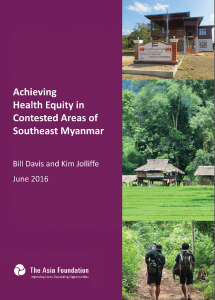 Throughout decades of ethnic armed conflict, the governance environment in many of Myanmar’s non- Burman areas has become deeply fractured, as ethnic armed organizations (EAOs) have established parallel governance systems, including healthcare departments. This report gives an overview of the parallel Ministry of Health (MoH) and EAO-linked health systems that exist in southeast Myanmar, and looks at how coordination and cooperation have increased since ceasefires were signed in 2011 and 2012 […]
Throughout decades of ethnic armed conflict, the governance environment in many of Myanmar’s non- Burman areas has become deeply fractured, as ethnic armed organizations (EAOs) have established parallel governance systems, including healthcare departments. This report gives an overview of the parallel Ministry of Health (MoH) and EAO-linked health systems that exist in southeast Myanmar, and looks at how coordination and cooperation have increased since ceasefires were signed in 2011 and 2012 […]
Myanmar CSO Shadow Report on Thematic Issues: Violence against Women
This CEDAW Shadow Report is written by CEDAW Action Myanmar (CAM). This working group is established in 2012 and consists of 15 local organizations. The report consists of perceptions of 309 (with 226 women and 83 men) respondents who participated in a survey; along with news from print and social media […]
• • •Our Customary Lands
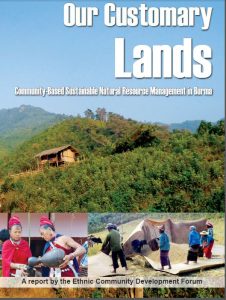 In January 2016 the government adopted a National Land Use Policy, which included the recognition of customary land management practices. While this is a welcome fi rst step in the necessary integration of Burma’s customary land management systems with the national-level system, there is an urgent need for constitutional reform and devolution of land management powers prior to any such integration […]
In January 2016 the government adopted a National Land Use Policy, which included the recognition of customary land management practices. While this is a welcome fi rst step in the necessary integration of Burma’s customary land management systems with the national-level system, there is an urgent need for constitutional reform and devolution of land management powers prior to any such integration […]
2016 Trafficking in Persons Report – BURMA: Tier 3
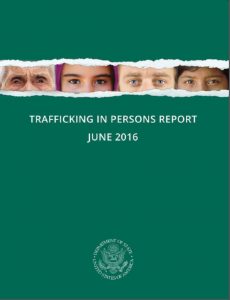 Burma is a source country for men, women, and children subjected to forced labor and for women and children subjected to sex trafficking, both in Burma and abroad. Some Burmese men, women, and children who migrate for work abroad—particularly to Thailand and China, as well as other countries in Asia, the Middle East, and the United States—are subjected to forced labor or sex trafficking […]
Burma is a source country for men, women, and children subjected to forced labor and for women and children subjected to sex trafficking, both in Burma and abroad. Some Burmese men, women, and children who migrate for work abroad—particularly to Thailand and China, as well as other countries in Asia, the Middle East, and the United States—are subjected to forced labor or sex trafficking […]

 All posts
All posts